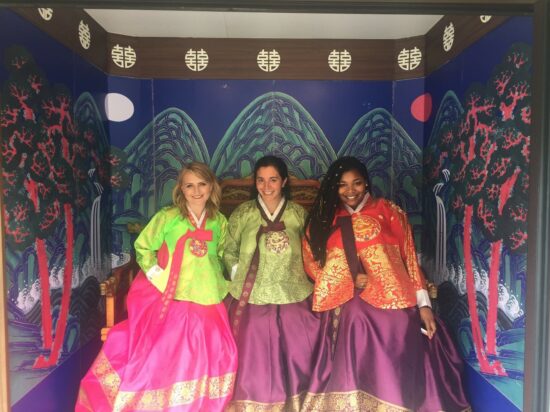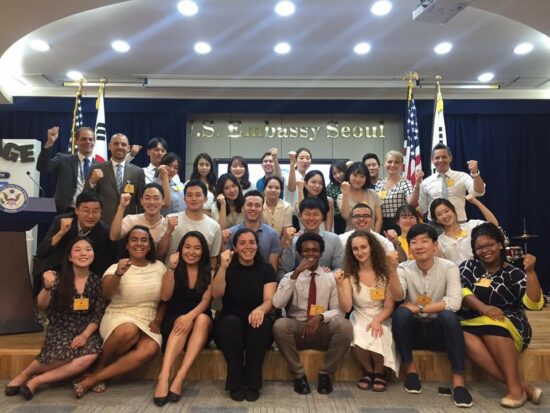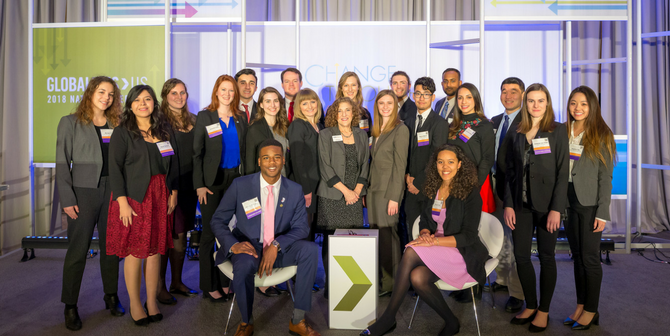By Katelyn McAlister, 2018 Global Ties U.S. Emerging Leader
Editor’s note: This summer, Katelyn McAlister, a 2018 Emerging Leader and former intern at International House, participated in the U.S. Congress-Republic of Korea National Assembly Exchange Program (implemented by Meridian International Center). She shares how participating in these programs helped inform her long-term professional goals.

Katelyn (left) and fellow participants, Jarrett Fisher and Nasya Daelyn, wear hanbok, or traditional Korean dresses. Photo credit: Jarrett Fisher
I always knew I wanted to become a Foreign Service Officer (FSO), but I wasn’t sure which track (or “cone”) was best suited for me, much less how to develop the necessary skills to be competitive. Then I did an internship at International House in Charlotte, NC where I was exposed to the world of international exchange programs. Having been an exchange participant several times, I was passionate about exchanges, yet had no idea that I could have a career in this field.
Luckily, I had mentors who taught me everything about exchanges and how to get more involved. This past spring, I was nominated and accepted as a Global Ties U.S. Emerging Leader to attend the National Meeting. I got to network with professionals in international exchange and at the U.S. Department of State, gaining first-hand career advice. I can speak for our entire cohort of Emerging Leaders when I say that participating in this program transformed our careers. Only six months after the program, many of us now work for Global Ties U.S. Community-Based Members and National Program Agencies, intern for U.S. Embassies, received a Fulbright Scholarship, or are on track to becoming an FSO.
As for me, I received the opportunity to participate in the U.S. Congress-Republic of Korea National Assembly Exchange Program. Facilitated by Meridian International Center, the two-way youth exchange took place over three weeks in the U.S. and South Korea. Each of us required a recommendation from our government representatives in order to participate. For me, that was the Honorable Alma Adams of North Carolina’s 12th District.

American and Korean youth gather at the U.S. Embassy in Seoul. Photo credit: Honggyu Kim
Both delegations spent one week in Washington, DC meeting with U.S. Government officials, think tanks, and academics like Victor Cha, Senior Advisor and Korea Chair at the Center for Strategic and International Studies. Afterward, the Korean delegation continued their journey across the U.S. to visit Little Rock, AR and Albuquerque, NM. Meanwhile, the U.S. delegation traveled to South Korea for two weeks, visiting the cities of Seoul, PyeongChang, Gangneung, and Gwangju to meet with government and civilian officials. We tried Korean food, stayed with host families, wore traditional costumes, and even crossed the Military Demarcation Line in the Demilitarized Zone (DMZ).
Throughout these visits, both delegations learned more about the U.S. legislative process, as well as Korea’s history, rapid modernization and economic development, and perspectives on the peninsula’s unification with North Korea. We gained valuable insights into the reasons why the U.S.-Korea relationship is so important. As a result, we grew as individuals and professionals.

The 2018 cohort of the Emerging Leaders Program at the 2018 National Meeting. Photo credit: Abe Landes
Thanks to globally-focused professional development opportunities like my internship at International House, the Emerging Leaders program, and the U.S. Congress-Republic of Korea National Assembly Exchange Program, I am certain of my passion for exchanges and goal of pursuing the Public Diplomacy cone of the U.S. Foreign Service. In the future, I hope to continue having opportunities to work on international exchange programs. As we form the next generation of elected officials, diplomats, and professionals, I believe we are better prepared to represent the United States and promote mutual understanding among the international community.
